Key takeaways:
- Eco-friendly finance integrates environmental considerations into financial decisions, allowing individuals to align investments with personal values.
- Sustainable saving promotes community engagement and resilience against economic fluctuations, emphasizing the importance of supporting local eco-friendly businesses.
- Adopting a minimalist lifestyle encourages thoughtful purchasing, focusing on quality over quantity, leading to greater financial freedom and reduced environmental impact.
- Impact investing not only seeks financial returns but also aims to create positive social and environmental change, fostering a connection to local initiatives.

Understanding eco-friendly finance
Eco-friendly finance revolves around the idea of integrating environmental considerations into financial decisions. It’s not just about saving money; it’s about investing in a future where both our finances and our planet thrive together. When I first encountered this concept, I found myself questioning how my money could positively impact the world around me – it was a revelation.
To me, eco-friendly finance means choosing products and services that prioritize sustainability. I remember switching to a green bank, which not only offers competitive rates but also supports renewable energy projects. This decision brought me a sense of fulfillment, knowing my banking choices were aligned with my values. Have you ever thought about where your money goes? A little reflection can lead to profound discoveries about the power of your financial choices.
Another essential aspect is understanding the role of sustainable investments. I once dove into researching impact investing and was amazed to find companies that focus not just on profits but on making a difference. It’s about being mindful of where your capital flows, ultimately fostering businesses that prioritize environmental health and social responsibility. Realizing I could contribute to positive change through my investments was not just empowering; it aligned my financial habits with a vision for a more sustainable future.
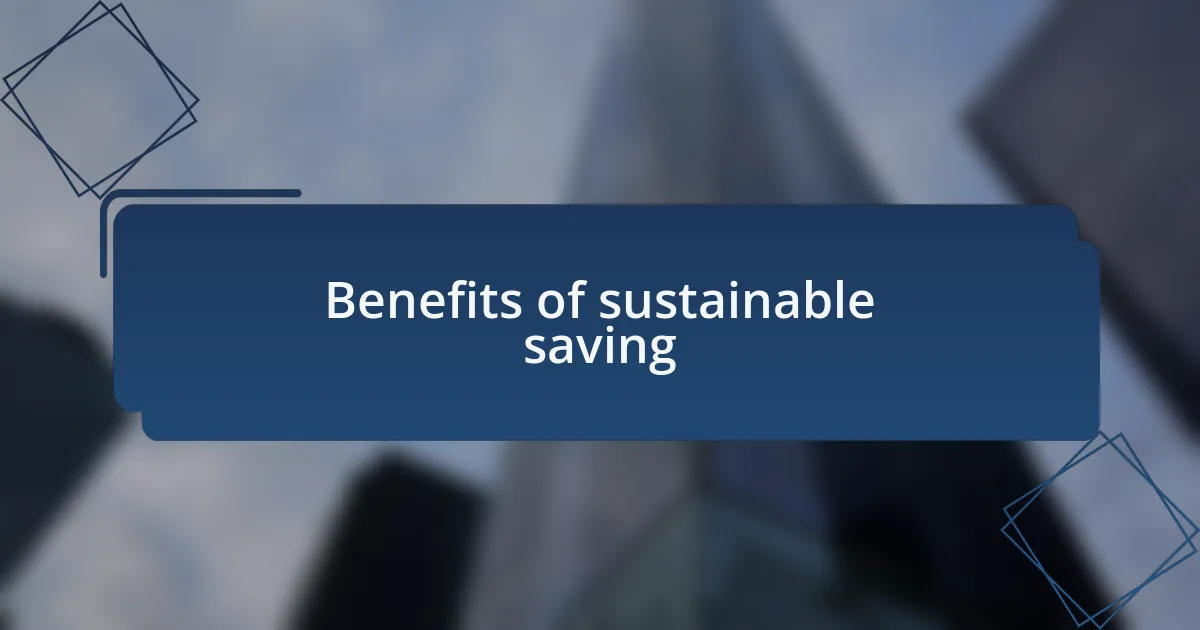
Benefits of sustainable saving
Sustainable saving is not just a smart financial strategy; it also promotes a healthier planet. For example, I remember feeling a sense of relief when I realized that by investing in energy-efficient products, I was not only saving money on my utility bills but also reducing my carbon footprint. Isn’t it satisfying to know that our daily choices can contribute to a larger positive impact?
Moreover, maintaining a sustainable savings approach fosters a sense of community. When I redirected my savings to local businesses that prioritize eco-friendly practices, I felt a deeper connection to my neighborhood while supporting economic growth. Isn’t it amazing how our financial decisions can nourish both our wallets and the local environment?
In the long run, sustainable saving helps build resilience against economic fluctuations. Reflecting on my experiences, I noticed that my investments in renewable energy and sustainable agriculture have not only yielded promising returns but also held strong during market changes. Isn’t it reassuring that choosing to save sustainably can offer financial stability while being kinder to our planet?
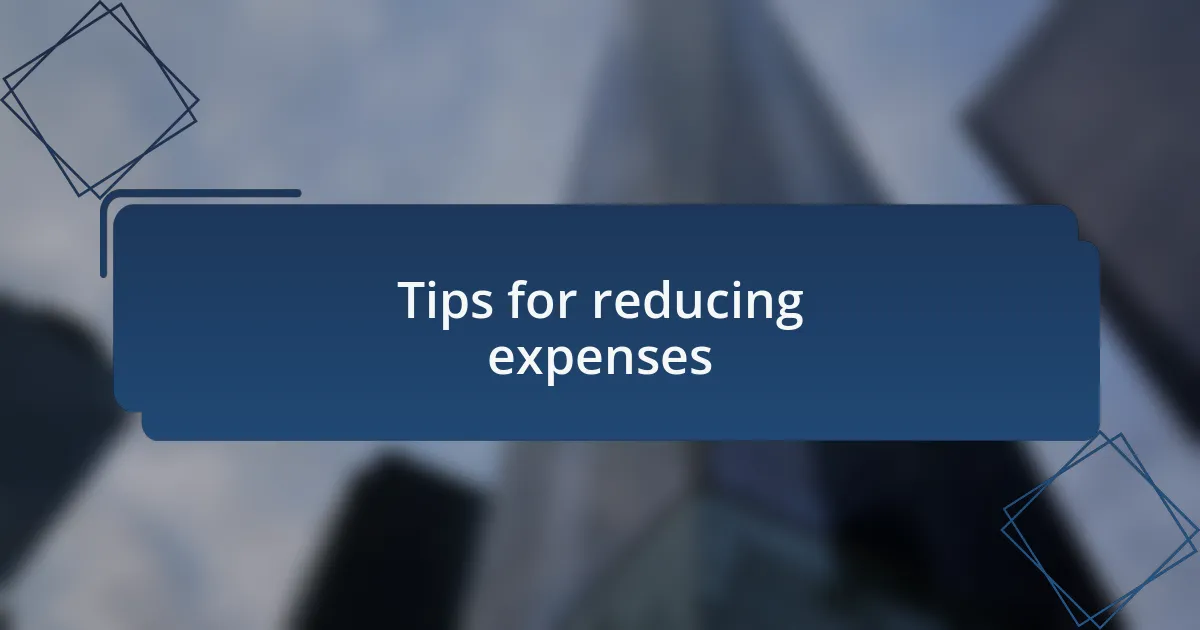
Tips for reducing expenses
One effective way to reduce expenses is to reevaluate monthly subscriptions. I once took a hard look at my own subscriptions and discovered I was paying for a streaming service I hadn’t used in months. Canceling it not only saved me money each month but also sparked a shift in my mindset about value—are you really using what you’re paying for?
Another tip is to embrace meal planning. I can’t tell you how much I’ve saved by organizing my meals for the week ahead. By creating a shopping list focused on these meal plans, I find I waste less food and avoid those impulse buys at the grocery store. Doesn’t it feel great when a little planning translates to extra cash in your pocket?
Lastly, consider swapping instead of shopping. When I participate in local swap events with friends, I often walk away with clothes and household items I genuinely need without spending a dime. It’s not only a fantastic way to update my possessions, but it also fosters relationships within my community. Have you ever thought about how much fun it could be to exchange items with friends instead of heading to the store?
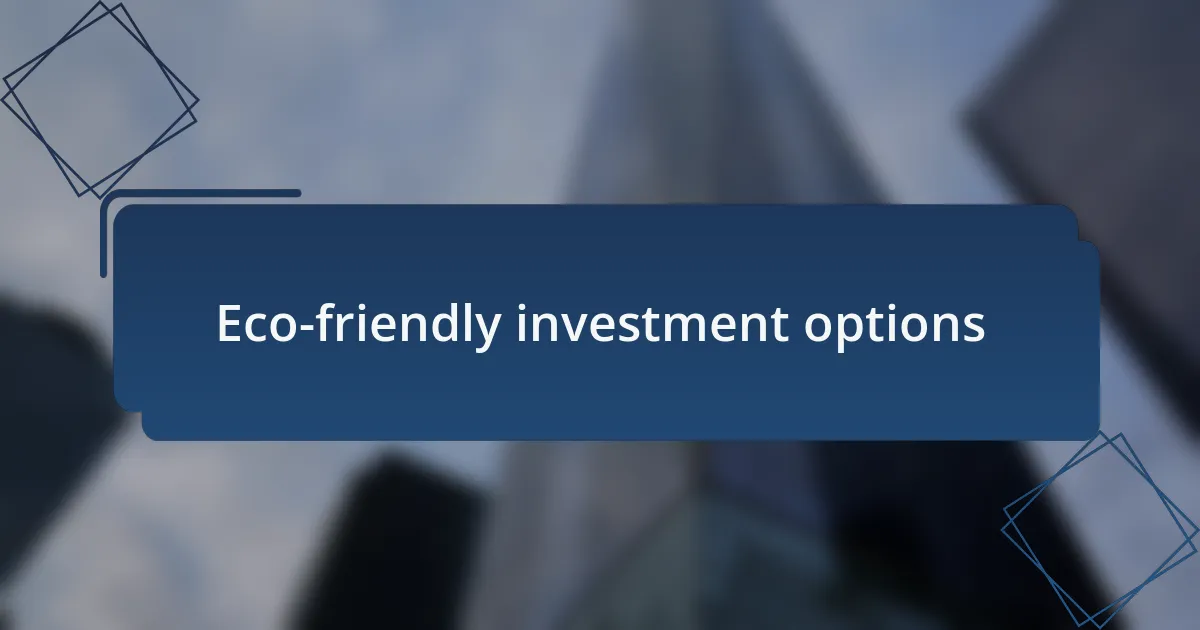
Eco-friendly investment options
Investing in green bonds has become one of my go-to strategies for eco-friendly investments. These bonds finance projects that have a positive environmental impact, like renewable energy or clean transportation. I remember the first time I invested in a green bond; it felt empowering to know that my money was supporting sustainable initiatives while also yielding a return. Have you considered how your investments can reflect your values?
Another intriguing option is investing in sustainable mutual funds. These funds carefully curate a portfolio of companies that prioritize environmental, social, and governance (ESG) criteria. I once attended a workshop on sustainable investing, and it was eye-opening to see how many companies are making a real difference while still generating profits. Why not align your financial growth with your commitment to the planet?
Finally, have you looked into impact investing? This type of investment goes beyond just seeking financial returns; it aims to create positive social and environmental change. Personally, I’ve found that investing in local eco-ventures not only benefits my community but also fosters a sense of connection and purpose for me. Isn’t it remarkable how financial choices can ripple out to create tangible benefits for both our wallets and the world?
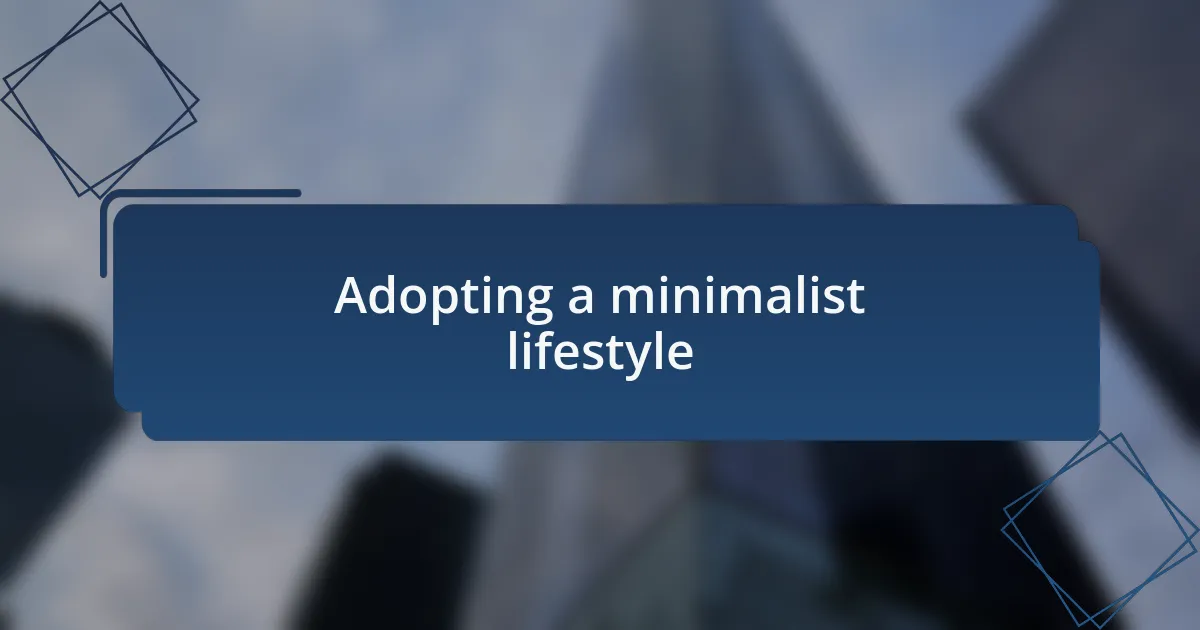
Adopting a minimalist lifestyle
Embracing a minimalist lifestyle has transformed my approach to spending and saving. I’ve learned that less really is more; when I declutter my living space, I also declutter my mind. It’s liberating to let go of items that don’t serve a purpose. Have you ever felt a weight lifted when clearing out belongings you’ve held onto for too long?
One of the most impactful changes I made was to evaluate my purchases carefully. Now, instead of impulsively buying things, I ask myself whether an item will genuinely enhance my life. I remember when I resisted the urge to buy a trendy gadget that everyone else seemed to have; instead, I put that money towards an experience that truly mattered. Isn’t it incredible how prioritizing meaningful purchases can lead to richer, more fulfilling experiences?
Moreover, adopting minimalism has encouraged me to focus on quality over quantity. I invest in fewer but higher-quality items that last longer, which ultimately saves me money in the long run. This mindset shift has not only eased my financial burden but has also reinforced my commitment to sustainability. How can we not appreciate the beauty of owning fewer things when it leads to greater financial freedom and a lighter footprint on the planet?
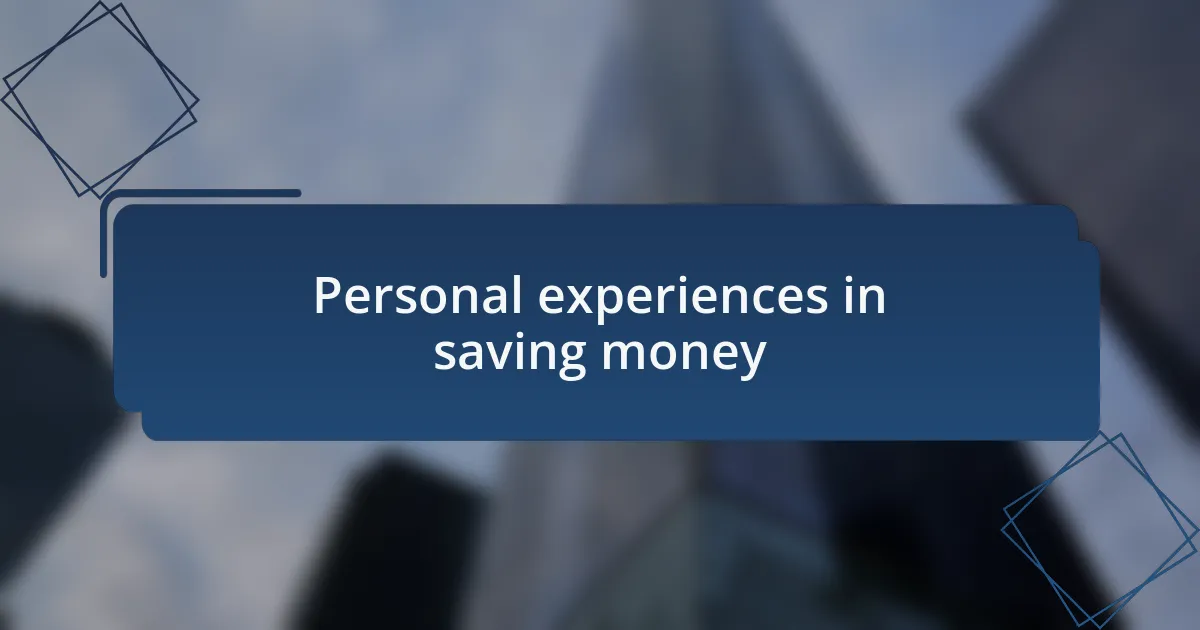
Personal experiences in saving money
My journey towards saving money sustainably began when I made a conscious decision to meal prep. I recall my first week of planning meals; it was a revelation. Not only did I save funds by buying groceries in bulk, but I also discovered the joy of cooking. Have you ever felt proud of a home-cooked meal that turned out better than takeout? It became clear to me that saving money doesn’t mean compromising on quality or flavor.
Another experience that stands out is when I started walking or biking instead of taking public transport or driving. Initially, it was a challenge to break my old habits, but I soon realized how much money I was saving on commuting costs. Plus, the added benefit of getting exercise and fresh air was a delightful surprise. Isn’t it fascinating how changing one habit can create a domino effect in our lives?
I also found that participating in local swap meets has been a clever way to reduce expenses while surrounding myself with a vibrant community. One memorable day, I traded a pair of shoes I hardly wore for a beautiful vintage jacket. This exchange not only enriched my wardrobe but also deepened my connection to my neighborhood. How rewarding is it to find joy in sharing rather than owning more?